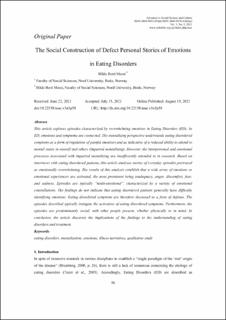The Social Construction of Defect : Personal Stories of Emotions in Eating Disorders
Peer reviewed, Journal article
Published version

Åpne
Permanent lenke
https://hdl.handle.net/11250/2979667Utgivelsesdato
2021Metadata
Vis full innførselSamlinger
Originalversjon
Moen, H. B. (2021). The social construction of defect: Personal stories of emotions in Eating Disorders. Advances in Social Science and Culture (ASSC), 3(3), 58-79. doi: 10.22158/assc.v3n3p58Sammendrag
This article explores episodes characterized by overwhelming emotions in Eating Disorders (ED). In ED, emotions and symptoms are connected. The mentalizing perspective understands eating disordered symptoms as a form of regulation of painful emotions and as indicative of a reduced ability to attend to mental states in oneself and others (impaired mentalizing). However, the interpersonal and emotional processes associated with impaired mentalizing are insufficiently attended to in research. Based on interviews with eating disordered patients, this article analyses stories of everyday episodes portrayed as emotionally overwhelming. The results of this analysis establish that a wide array of emotions or emotional experiences are activated, the most prominent being inadequacy, anger, discomfort, fear, and sadness. Episodes are typically “multi-emotional”, characterized by a variety of emotional constellations. The findings do not indicate that eating disordered patients generally have difficulty identifying emotions. Eating disordered symptoms are therefore discussed as a form of defense. The episodes described typically instigate the activation of eating disordered symptoms. Furthermore, the episodes are predominantly social, with other people present, whether physically or in mind. In conclusion, the article discusses the implications of the findings to the understanding of eating disorders and treatment.